Infrastructure Financing in South AsiaSouth Asia is the world's fastest-growing region. The region has also shown significant reduction in poverty and income inequality owing to improved road transport, electricity, and sanitation. The growth is attributed partly to the improvement in infrastructure in Bangladesh, India, and Sri Lanka. Yet, to sustain growth and deal with climate change, the region must invest more to develop infrastructure in the next 15 years. This paper looks at public and private sector financing of infrastructure and discusses the factors driving infrastructure investment. Author: Shikha Jha and Rosa Mia Arao Year: 2018 Download Tags: Bangladesh, India, Sri Lanka, Energy, ICT, Infrastructure, Public Private Partnerships, Transport Embracing the E-commerce Revolution in Asia and the PacificAsia is the world’s largest e-commerce marketplace. In South Asia, India has the largest e-commerce market at $33 billion in 2017. Maldives, Bhutan, and Sri Lanka lead the subregion in terms of percentage of the population with access to the internet. This report introduces a framework for analyzing the quality of e-commerce development in the Asia-Pacific region and discusses lessons learned regarding e-commerce development. The framework incorporates economic factors, institutional environment, and social acceptance to assess e-commerce development and suggest the way forward. Author: Asian Development Bank, United Nations Economic and Social Commission for Asia and the Pacific Year: 2018 Download Tags: ADB, ICT, Trade, UNESCAP, Maldives, Bhutan, Sri Lanka World Trade Report 2017: Trade, Technology, and JobsEconomic growth over the last 25 years has been accompanied by unprecedented economic change. Over the past two decades, many countries have experienced significant transformations in the sectoral and occupational structure of employment. This report examines how technology and trade affect employment and wages and analyzes the challenges for workers and firms in adjusting to changes in labor markets. It looks at how governments could increase the positive impact of open trade and technological trade in South Asia and around the world. Author: World Trade Organization Year: 2017 Download Tags: Trade, ICT, Employment, Global Value Chains, South Asia Myanmar’s Integration with the WorldMyanmar only recently began participating in global trade and investment. It has large untapped potential for trade and investment in agriculture and forest-based industries, and services, such as tourism and information technology. This book examines Myanmar’s access to the global market and examines the implication of Myanmar’s democratic transition, the progress of Myanmar’s industry and infrastructure, its international linkages, and options for increased integration in regional economic groups. The book also analyzes how Myanmar could exploit global value chains. Author: Prabir De and Ajitava Raychaudhuri, editors Year: 2017 Download Tags: Agriculture, Global Value Chains, Infrastructure, Investment, ICT, Myanmar, Regional Integration, Trade 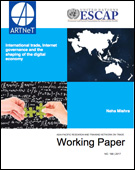 International Trade, Internet Governance and the Shaping of the Digital Economy (AWP No. 168)The connection between trade and internet governance presents complex policy challenges in today’s digital economy. This working paper highlights several observations and findings on the complex relationship between international trade and the internet. It recognizes the fact that the internet is not only driven by economic factors, but is a complex phenomenon shaped by political and social engagement, technical efficiency, and cultural and moral considerations. It sees the importance of synergizing international trade and the internet, and recommends that the World Trade Organization and other trade institutions develop mechanisms to consult internet governance institutions such as the Internet Engineering Task Force, World Web Wide Consortium, Internet Corporation for Assigned Names and Numbers, International Telecommunications Union, Internet Society, and the Internet Governance Forum. Author: Neha Mishra Year: 2017 Download Tags: ICT, Trade Facilitation, UNESCAP, WTO Eradicating Poverty and Promoting Prosperity in a Changing Asia-PacificThis report explores five long-term trends in the Asia-Pacific region that will shape approaches to poverty alleviation and the prospects for achieving prosperity: regional economic cooperation and integration; rural–urban transitions; demographic changes; ICT access and connectivity; and demand for natural resources. It examines the changing development context in South Asian and other economies. It also looks at opportunities created by regional cooperation and integration that intend to bring about shared economic benefits. Author: United Nations Economic and Social Commission for Asia and the Pacific, Asian Development Bank, United Nations Development Programme Year: 2017 Download Tags: ADB, Connectivity, ICT, Regional Cooperation, Sustainability, UNESCAP, UNDP, Bangladesh, Bhutan, India, Maldives, Nepal, Sri Lanka Can Online Markets Make Trade More Inclusive? Technology-driven online trade reduces income inequality and makes trade more inclusive. To fully realize these new gains from trade, governments and export promotion agencies should address barriers to e-commerce. Technology made available by online markets has significantly reduced the cost of entry into international markets for small and medium-sized firms, which can now reach more distant consumers and create a global reputation as a seller at very low costs. Online firms, even those smaller than traditional offline firms, export, and this paper shows that online markets help reduce income inequality by providing smaller firms access to international markets. Author: Andreas Lendle and Marcelo Olarreaga Year: 2017 Download Tags: ADB, ICT, India, Trade The Little Data Book on Information and Communication TechnologyThis book presents quick indicators for more than 200 countries showing data on key indicators of information and communications technology (ICT), including access, quality, affordability, efficiency, sustainability, and applications. It includes data for Bangladesh, Bhutan, India, Maldives, Myanmar, Nepal, and Sri Lanka. Author: World Bank and International Telecommunications Union Year: 2017 Download Tags: Bangladesh, Bhutan, ICT, India, Maldives, Myanmar, Nepal, Sri Lanka, South Asia, WB 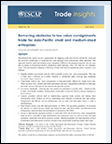 Removing Obstacles to Low Value Consignments (Trade Insights: Issue No. 18)Diffusion of digital technology and digitalization of products and services are allowing developing country small and medium-sized enterprises (SMEs)—which generate the majority of employment, especially in landlocked developing countries such as Nepal—to become globally competitive and participate in international trade. However, several barriers continue to hinder developing country SMEs to maximize benefits of cross-border digital trade. This publication recommends critical actions, including raising de-minimis thresholds; reducing Customs document requirements; developing low-cost and efficient transportation, delivery services, telecommunications and broadband networks; and establishing a legal framework that enhances conduct of online transactions. Additionally, neighbors in the region must coordinate and work together to build the required infrastructure, and to allow for mutual recognition or harmonization of systems, procedures, enforcement mechanisms and laws affecting digital trade. Author: Pascale Bourquin and Adam Heal Year: 2016 Download Tags: Small and Medium Enterprise, Nepal, ICT, Customs, Trade Facilitation 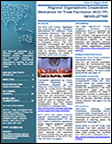 Regional Organizations Cooperation Mechanism for Trade Facilitation (ROC-TF) Newsletter: Issue X, August 2016This issue highlights the framework agreement on cross-border paperless trade facilitation adopted by the United Nations Regional Commission for Asia-Pacific, which will facilitate the exchange of electronic trade data and documents between participating United Nations Economic and Social Commission for Asia and the Pacific (UNESCAP) member states, and the 2016 Global Facilitation Partnership for Transportation and Trade forum. The latterencourages the private sector to mobilize expertise in support of trade facilitation reforms to develop effective trade facilitation solutions for small and medium-sized enterprises. The Newsletter also features SASEC-supported initiatives, including the launch of the new Maldives Customs Service training module on Customs valuation, as well as data collection for establishing the Trade and Transport Facilitation Monitoring baseline in Bhutan. The ROC-TF newsletter is a biannual publication featuring updates, publications and forthcoming activities of regional and international organizations working on trade facilitation in the Asia-Pacific region, including the Asian Development Bank, the World Customs Organization, and UNESCAP. Author: United Nations Economic and Social Commission for Asia and the Pacific Year: 2016 Download Tags: Trade Facilitation, ICT, Maldives, Customs, SASEC, Customs Valuation, Bhutan Cleantech Start-ups Can Solve Climate ChangeThe Asian Development Bank (ADB), through its Climate Technology Finance Center, seeks to accelerate clean technology entrepreneurship and investment in Asia by supporting programs that aim to produce investable clean technology, risk capital for clean technology, technological knowledge, and a stronger clean technology ecosystem. This brochure gives a brief background on how ADB works with start-ups across Asia to promote more efficient management of energy and natural resources. Author: Asian Development Bank Year: 2016 Download Tags: ICT, Energy, Environment, India 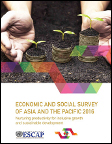 Economic and Social Survey of Asia and the Pacific 2016The 2016 edition of UNESCAP’s Economic and Social Survey of Asia and the Pacific encourages the region to rethink its development strategy. As 2016 marks the beginning of the 2030 Agenda for Sustainable development, the period is also characterized by an outlook clouded by uncertainty, with growth expected to plateau at about 5% in 2016 and 2017. Exports bound for developed economies continue to move sluggishly and domestic demand remain moderate. Thus, to bolster economic growth, the Survey recommends adopting a development model that raises domestic and regional demand. Along with active labor market policies and greater social protection, regional economic cooperation and integration--in areas covering capital markets, intraregional trade, infrastructure development, and energy and information and communications technology (ICT) connectivity--can be an important avenue for boosting domestic and regional demand. Author: United Nations Economic and Social Commission for Asia and the Pacific Year: 2016 Download Tags: Economic Growth, Regional Cooperation, ICT, Energy Information and Communication Technologies for Trade and Transport FacilitationInformation and Communication Technologies (ICT) provides efficiencies that can deliver many advantages for trade and transport facilitation (TTF) including Single Windows, automated business processes, digitalization of procedures, simpler interaction and transmission of data, and faster decision-making abilities. This paper looks at the business needs of TTF and explains the requirements of an architectural model to support TTF, with policy makers in mind. It highlights the need to integrate and modernize ICT systems and architecture so that ICT can respond to the needs of trade and transport facilitation. Author: UNESCAP and UNNExT Year: 2016 Download Tags: ICT, Trade Facilitation, Transport Facilitation, Single Window, UNESCAP Doing Business 2016The World Bank's Doing Business 2016: Measuring Regulatory Quality and Efficiency reports that South Asia ranked second among regions, after Europe and Central Asia, in the largest share of economies implementing at least one reform to make doing business easier in the past year. 6 out of 8 economies in South Asia implemented a total of 9 reforms, including Bhutan, India - following the Government of India's ambitious program to increase ease of doing business launched in 2014 - and Sri Lanka. However, South Asia still lags behind in use of online systems in regulatory processes. The highest ranked economy in the region is Bhutan, with a global ranking of 71. Author: The World Bank Year: 2015 Download Tags: Business Efficiency, ICT, Bhutan, WB 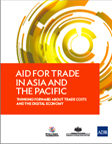 Aid for Trade in Asia and the Pacific: Thinking Forward About Trade Costs and the Digital EconomyAid for Trade (AfT) flows have increased each year since 2006 in Asia and the Pacific. While regional aggregate trade costs continue to fall, many subregions still struggle with trade costs that are substantially higher than the global average. This report highlights and explores how AfT contributed to these emerging trends in Asia and the Pacific and how to continue to address trade costs moving forward. Among the subregions, the Pacific (along with South Asia) has made the greatest improvements in the Logistics Performance Index from 2007-2014. Recent exporter surveys reveal a movement toward niche products and leveraging of e-commerce as a means to overcome cost and distance. Emerging digital technologies such as e-commerce further offers a new set of opportunities for economies in the region to grow through trade. Author: Asian Development Bank Year: 2015 Download Tags: Aid for Trade, Asia-Pacific, ICT, South Asia, Trade, Bangladesh, Bhutan, India, Sri Lanka, Agriculture, Energy, Transport UNRCs Trade Facilitation and Paperless Trade Implementation Survey 2015: Asia and the Pacific Report This report presents data on trade facilitation and paperless trade implementation from 44 economies across the Asia-Pacific region, covering 5 different subregions. It lays out key findings on implementation levels of general trade facilitation measures and ICT-based trade facilitation measures across the region, and provides empirical evidence for advancing trade facilitation. Findings suggest that there is still significant room for progress. In South Asia, regional average trade implementation comes a little above 40%. The report also noted that cross-border paperless trade facilitation is the least implemented of all groups of measures. Author: United Nations Economic and Social Commission for Asia and the Pacific Year: 2015 Download Tags: Trade Facilitation, Asia-Pacific, ICT Aid for Trade in Asia and the Pacific 2015This Asian Development Bank report explores the potential of the digital economy to improve the inclusiveness of Aid for Trade (AfT). It uses the review of AfT as a springboard to explore new ways of thinking and how to address issues such as high trade costs in some regions. In particular, it considers how to build on information and communications technology and infrastructure connectivity from established AfT spending. The report also highlights the experience of exporters to illustrate the unique challenges and opportunities for trade-driven growth in a region where high trade costs are structural. Author: Alisa Di Caprio and Kati Suominen Year: 2015 Download Tags: ICT, Infrastructure, Trade, ADB, Asia-Pacific, Exports, Economic Growth, Trade Facilitation Key Recommendations: South-Asia Consultation on the Post-2015 Development AgendaThe South Asian Association for Regional Cooperation, the United Nations Development Programme, the United Nations Economic and Social Commission for Asia and the Pacific, and the Asian Development Bank organized the South Asia Consultation on the Post-2015 Development Agenda in Nagarkot, Nepal on 26-28 August 2014. This Nagarkot Statement contains the eight guiding principles for future goals, key messages and recommendations on South Asia’s development priorities, financing for a post-2015 development agenda to support sustainable development, and technology access, including data, monitoring and accountability. Author: United Nations Economic and Social Commission for Asia and the Pacific Year: 2015 Download Tags: South Asia, Sustainability, ICT Bridging Transport, ICT, and Energy Infrastructure Gaps for Seamless Regional ConnectivityThis publication is a contribution by the United Nations Economic and Social Commission for Asia and the Pacific to deliberations at the Second United Nations Conference on Landlocked Developing Countries (LLDCs) in Vienna, Austria, 3-5 November 2014. It shows regional connectivity as an unfinished agenda and bridging infrastructure gaps as a complex challenge for LLDCs. While physical infrastructure is a priority, this report argues that deeper regional integration – through regionally cohesive and terrestrial networks – is key to effectively linking Asian LLDCs to the region’s infrastructure networks. Author: United Nations Economic and Social Commission for Asia and the Pacific Year: 2014 Download Tags: Transport, ICT, Energy, UNESCAP, SASEC, Connectivity, Infrastructure, Bangladesh, India, Nepal, Sri Lanka, Trade, Trade Facilitation, Policy, Trade Policy SASEC Website BrochureThis promotional brochure for the SASEC website features the web portal as a one-stop shop for information on SASEC activities, events, projects, and knowledge materials. The SASEC website seeks to build a dynamic discussion platform and repository of data on regional cooperation. Author: Asian Development Bank Year: 2014 Download Tags: SASEC, Knowledge Product, ICT, ADB, Bangladesh, Bhutan, India, Maldives, Nepal, South Asia, Transport, Trade Facilitation, Energy SASEC BrochureThis promotional brochure is a concise introduction to the South Asia Subregional Economic Cooperation (SASEC) Program, highlighting the main areas of regional cooperation and activity. It includes facts and figures about SASEC projects in transport, trade facilitation, energy, and ICT. Author: Asian Development Bank Year: 2014 Download Tags: SASEC, Trade Facilitation, Regional Cooperation, ICT, ADB, Bangladesh, Bhutan, India, Nepal, Maldives, Sri Lanka, Energy, Transport, Connectivity, Myanmar Economic and Social Survey of Asia and the Pacific 2014This 2014 edition of UNESCAP's flagship publication emphasizes the importance of furthering regional connectivity in Asia-Pacific—a region which, despite significant reductions in poverty levels, is now witnessing rising income inequality, both within and between countries. It calls for driving the region's growth by exploiting the interdependence and synergies of five elements: trade and transport connectivity, ICT networks, energy connectivity, people-to-people networks, and promotion of knowledge-based economies, and advocates approaching connectivity as a regional public good. Author: UNESCAP Year: 2014 Download Tags: Economic Integration, Regional Cooperation, Poverty Reduction, Asia-Pacific, Connectivity, Energy, ICT, Bangladesh, Bhutan, India, Maldives, Sri Lanka, Trade, Transport, UNESCAP 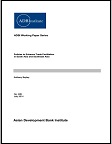 Policies to Enhance Trade Facilitation in South Asia and Southeast AsiaThis Asian Development Bank Institute publication identifies the state of play of trade facilitation and provides an overview of intra- and inter-regional trade in South and Southeast Asia. It highlights key challenges and bottlenecks to effective trade facilitation, ranging from the lack of expert human resources such as information technology specialists in small landlocked countries (Bhutan and Nepal), to the high border transaction costs and severe congestion faced at border crossing points, and the lack of effective dialogue on bilateral enhancement of trade facilitation. Regional initiatives such as the South Asia Subregional Economic Cooperation Program aim to address these challenges through customs modernization and harmonization, automation, and the use of international best practices in border procedures. Author: Anthony Bayley Year: 2014 Download Tags: South Asia, Trade Facilitation, Trade Policy, Southeast Asia, ADB, ICT, Bhutan, Nepal, SASEC, Customs SASEC ICT Development Master PlanThis report represents the first comprehensive multilateral ICT development plan. Its primary objective is to create a framework that will support the already existing ICT plans of Bangladesh, Bhutan, India, and Nepal and help these SASEC countries collaborate more effectively with each other. Author: Asian Development Bank Year: 2006 Download Tags: ICT, Regional Cooperation, Regional Integration, SASEC, Bangladesh, Bhutan, India, Nepal Cross- Border Private Sector Cooperation in ICT Among SASEC CountriesThis study explores the issue of cross-border cooperation in ICT among private sectors in Bangladesh, Bhutan, India, and Nepal. It discusses the ICT policy frameworks of the four SASEC countries, and gives an update on improvements in their ICT infrastructure and the state of their ICT infrastructure linkages. It further provides a set of recommendations for the way forward. Author: Asian Development Bank Year: 2004 Download Tags: ICT, Regional Cooperation |




